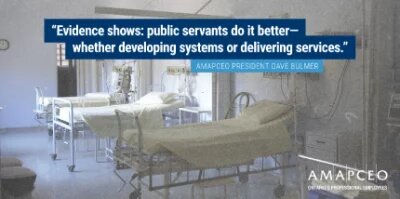
Tuesday, February 26, 2019
This morning, AMAPCEO learned the government announced they intend to merge six provincial health agencies—including Health Quality Ontario (HQO)—and dissolve the 14 Local Health Integration Networks (LHINs) to create a new “super-agency” called Ontario Health.
AMAPCEO represents 17 professional staff at Health Quality Ontario. They currently advise the government on how the province’s health system is performing. They develop clinical standards for health conditions, implement new technologies and tools to improve care, and collaborate on strategies to improve the patient experience.
“Our members have the education, experience, and expertise to improve healthcare in Ontario,” said AMAPCEO President Dave Bulmer. “They will be a critical resource to the government now and in the future, as the merger to Ontario Health moves forward.”
The merger into Ontario Health is expected to take some time. The union will be working with the government and the HQO employer to minimize any negative impacts on staff and to protect the important work they do for Ontarians.
“As someone who worked in the healthcare sector for my entire career, I understand the complexity of the system and recognize that an overhaul of this nature is certain to cause significant disruption,” said AMAPCEO President Dave Bulmer. “Change is never easy, and today’s news brings with it some uncertainty, both personally and professionally. AMAPCEO will do whatever is within our power to protect the professional staff at Health Quality Ontario through the provisions of our Collective Agreement and the law.”
AMAPCEO is not yet aware of what, if any, affect today’s news will have on its members at the Ministry of Health and Long-Term Care. The union has sought clarification from the OPS Employer and will share information as soon as possible.
Bulmer also addressed the need to protect public delivery of health services. “Minister Elliott was clear that public health care is a core Canadian value. While I commend her commitment to public funding, it is crucial that Ontarians’ care be publicly delivered, too. Time and again, we have seen that public servants do it better - whether in developing systems or delivering front line services.”